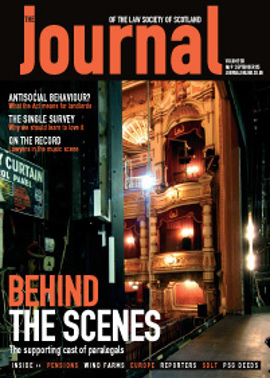Another string to the bow

“The first thing Philip Yelland said to me was that being a reporter is onerous, and I would certainly endorse that. It is, nevertheless, a fulfilling experience.”
So concluded Jim Buchan, Legal Manager, Law and Administration with Aberdeenshire Council in Banff, summing up his three years’ service as a reporter to the complaints system run by the Client Relations Office.
Though it is often overlooked in media reporting of the complaints handling issue, reporters, like client relations committee members, are drawn from the ranks of both solicitors and non-solicitors. Nevertheless, as David Newton of The PRG Partnership, Clydebank, comments, many cases do need a level of professional expertise: “Clearly a number of the non-solicitor reporters do very well, but quite a number of cases require legal knowledge of a technical nature, such as court procedure.”
Work on demand
With the well publicised rise in complaints, it would be easy to suppose that solicitor reporters comprise a dedicated but beleaguered band, desperately trying to keep their heads above a rising tide of paperwork. Not so. Without wishing to play down the commitment involved, each reporter in our sample was clear that they were able to take on only what they felt they could deal with – one case a month was the usual average, each case being finished before they asked for another.
A case can take almost any length of time. “Some maybe only have a dozen letters and take a couple of hours, but I have had others with two boxes of files and for a case like that, 20 hours is probably what is needed”, commented Martin Burns of Keegan Walker in Livingston. Bruce Rollo, consultant with Cupar firm Rollo Davidson & McFarlane, finds them time-consuming. “You have to sit down in a block of time and work on it. You do get into your own style of doing things, and you have to take time to get into the mindset of the person who acted in the case”.
When Jim Buchan has one on the go, he gives it most of his free evenings: “Even the most straightforward complaint requires detailed consideration, especially where I’m not minded to recommend upholding it. In fairness to complainers, I owe it to them to explain my reasoning adequately.”
The Society allows 30 days to prepare a report, though David Newton says he has been allowed longer if it’s a big case and they can’t get anyone to do it quicker.
The service ethic
Certainly an element of public-spiritedness usually lay behind the decision to apply. “My main reason was that I wanted to try and put something back into the profession”, says Helen Philp, then in private practice but now in-house with Scotia Gas Networks, Perth. “Something I could offer”, or “putting something back into the profession” were reasons offered by David Newton, now a Council member as well, Bruce Rollo, and Douglas Russell of Simpson & Marwick, Edinburgh, who also finds the work valuable in the context of his role as complaints partner.
Some could foresee a personal benefit. For Jim Buchan, it was a way of getting up to speed with practical private sector issues after 12 years in public service. Valerie O’Neil of Macfarlane Young, a small practice in Paisley, came from a slightly different angle – “A mixture of curiosity and paranoia! Paranoia about how others do things, and what not to do. It was mainly to get some insight.”
A question of judgment
Reporters offer some interesting comments when asked whether they find it difficult to reach a view on cases referred to them. “Sometimes, but not often”, responded Kay Leslie of Stewarts & Murdochs in Glasgow. “Cases tend to fall into one of two categories – one where you think, how could any solicitor have done that?, and one where the client just seems to be complaining about nothing.” “Some are very straightforward, but some are quite difficult”, is Douglas Russell’s view. “The Society ask about your areas of experience – it’s important not to give too wide an indication of your area of expertise. The non-solicitors who act as reporters obviously bring a different kind of experience to the job.”
For Bruce Rollo, the difficulty can lie in applying the balance of probabilities test; for Martin Burns it may be in deciding whether to recommend someone for prosecution for misconduct or that their file simply be marked with a finding of unsatisfactory conduct. Helen Philp points out the need to remain detached from a case – “you have to step back and make sure you look at it from both the complainer’s and the solicitor’s point of view”.
All value the feedback from the client relations committees who adjudicate on their cases and may or may not uphold their recommendations. “You can learn from that too, as you are told why the committee differs from you if that is the case”, says Martin Burns. Douglas Russell finds it “very pleasing if it says the report was helpful – it gives you a bit of a buzz. It’s also good to see what the committee decided to do, and interesting to see the different perspectives different people bring, especially if they differ from your conclusions”.
Appreciating the CRO
Most of the reporters in our sample have gone on to become committee members in addition. That, rather than interaction with other reporters is how they share experiences and learn from others. Helen Philp was pleased to be asked – “it helps the whole thing to focus”. But they also emphasise the support from the CRO if any difficulties arise with cases in hand. “You always feel they’re there to assist when appropriate”, Bruce Rollo states. “Your draft reports come back to you with comments if they feel there is anything you haven’t made clear.” “Superb”, is Jim Buchan’s verdict. “For my very first report I had an experienced case manager who could guide me through the process. And if you’re ever stuck, the case manager can guide you or put you on to another reporter or a committee member with the necessary experience.”
Seeing the CRO’s work at close quarters certainly enhances the reporters’ appreciation of what the case managers have to contend with. “It must be one of the most horrible jobs, and some of the cases are particularly stressful”, says Valerie O’Neil. “But they give you good support and feedback.”
Transparent system
“Overall the system works pretty well”, she adds. “I know it gets a lot of bad press, but it’s difficult to see how it could be done better, unless you’re going to pay someone else to do all the work we do now.” Indeed no one claimed to do the work for the prospect of the £100 flat fee per report.
“I’m impressed with the attitude on committees, especially of the non-solicitor members, and the 50-50 balance is pretty good”, says Bruce Rollo. “So it works pretty well, though you might think I would say that! The system is very transparent now and everyone gets a fair crack of the whip.”
While she agrees that the system works fairly and reaches proper conclusions, Helen Philp would like to see more solicitors willing to engage in conciliation with dissatisfied clients. “Sometimes people with a genuine complaint will manage to sort it out with the solicitor themselves, perhaps with an apology or some form of compensation, but sometimes the shutters just go up, the solicitor doesn’t want to know, and there’s a complete relationship breakdown. I’ve seen it happen.”
WHAT HAVE YOU LEARNED FROM DOING THE WORK?
“Without disclosing confidences I can share the lessons in my office, for example where a case has gone badly wrong” – Bruce Rollo
“A phenomenal amount. It has broadened my horizons as well as given me a much sounder grasp of basic principles of ordinary Scots law” – Jim Buchan
“It has certainly improved my knowledge of the laws and regulations regarding ethics and professional conduct… You also see files where the solicitor has done a good job and you can make a mental note to adopt their practice” – Martin Burns
“The importance of constant feedback to clients – lack of feedback is one of the main sources of complaints even if everything has been handled perfectly” – Kay Leslie
“I’m now paranoid about taking file notes – I’ve seen so many cases where there wasn’t anything. Even a handwritten scribble on the bottom of a letter is better than nothing” – Valerie O’Neil
“I find it easier now to deal with the firm’s own complaints – not that we have too many!” Douglas Russell
WOULD YOU RECOMMEND THE WORK TO OTHERS?
“Yes, definitely. It’s very interesting, very challenging. It’s better than doing the crossword of an evening!” – Kay Leslie
“People think it’s a huge time commitment but it isn’t” – Helen Philp
“I would do… It’s certainly interesting work, as well as assisting in an essential part of the work of the Society – David Newton
“It’s a way of getting forward – I’ve seen some relatively young, non-partner solicitors on committees and that’s a good thing” – Douglas Russell
“The CPD concession [up to five hours] apart, it also gives you a more objective viewpoint on your own desk… I think I can better anticipate things in the incoming mail before the alarm bell starts ringing” – Jim Buchan
“Absolutely. If I didn’t enjoy the work, I could give it up any time, but I’ve been doing it for over two years” – Martin Burns
PHILIP YELLAND WRITES:
There are currently around 130 solicitors who prepare reports for us. Some are more readily available than others. There is no minimum number of reports that a reporter needs to prepare in a year but we hope those involved will produce a minimum of four.
Anyone who is interested about becoming involved should write to me. I can send them an information sheet giving more detail, and if they are still interested we ask for their CV/details of their legal career and areas of expertise.
The training regime begins with the issuing of the reporter manual. That sets out the current complaints handling process, explains the role of a reporter, includes style reports and provides guidance on various issues such as assessment of compensation if a service complaint is justified. There is an initial training session which both solicitor and non-solicitor reporters attend, which goes through the role of the reporter, what is expected in terms of reporting and any questions people may have.
Follow-up training normally consists of refresher seminars which are held annually to cover changes in procedure, updated guidance and common issues raised by reporters. In addition, reporters are invited to sit in on a committee to see how the final stage of the decision making process works.
If a reporter has difficulties or is looking for guidance the case manager instructing, or myself or one of the management team should be able to help, or we can put them in touch with an experienced reporter who may assist.
Philip Yelland, Director, Client Relations Office
In this issue
- Moving in society
- Pots and kettles
- Unseen force
- Licence to let?
- The cost of a puff
- Select band
- Cross-border disputes: a practical way forward?
- No hiding place
- Safe as houses?
- Close connection
- Another string to the bow
- The ultimate sanction?
- A right and its exercise
- In good company
- Out of bounds
- Scottish Solicitors Discipline Tribunal
- Website reviews
- Book reviews
- The single survey: why it should be supported
- Drafting deeds of conditions - a real burden?
- SDLT online service






